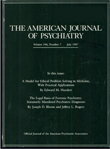Age at onset and gender of schizophrenic patients in relation to neuroleptic resistance
Abstract
OBJECTIVE: The age at onset of schizophrenia for males has usually but not always been reported to be less than that for females. Early onset has also been associated with poor response to neuroleptic treatment and worse long-term outcome. The authors compared age at onset in neuroleptic-resistant and -responsive schizophrenic patients to determine whether the gender difference in age at onset is related to response to neuroleptic treatment. METHOD: The subjects were 322 patients with schizophrenia or schizoaffective disorder who were consecutively admitted to a university hospital-based research program. RESULTS: Analysis of variance showed significant relationship between age at onset and both gender and longterm responsivity to neuroleptic drugs. The mean ages at onset in the neuroleptic-responsive men (mean = 21.2 years, SD = 6.1, N = 75), neuroleptic-resistant men (mean = 19.4 years, SD = 4.7, N = 119), and neuroleptic-resistant women (mean = 20.1 years, SD = 6.3, N = 77) were fairly similar, whereas that of the neuroleptic-responsive women (mean = 24.2 years, SD = 8.7, N = 51) was significantly greater than for all other groups. A simple effects model indicated that male and female neuroleptic-resistant patients did not differ significantly in mean age at onset, whereas male and female neuroleptic-responsive patients did. The effect of gender and neuroleptic responsivity on age at onset was related to schizophrenic subtype. CONCLUSIONS: These results confirm previous data indicating neuroleptic resistance is associated with early onset. The finding that the difference in age at onset between males and females is smaller in neuroleptic-resistant patients than in neuroleptic-responsive patients suggests that neuroleptic-resistant patients differ premorbidly as well as after onset of illness.



